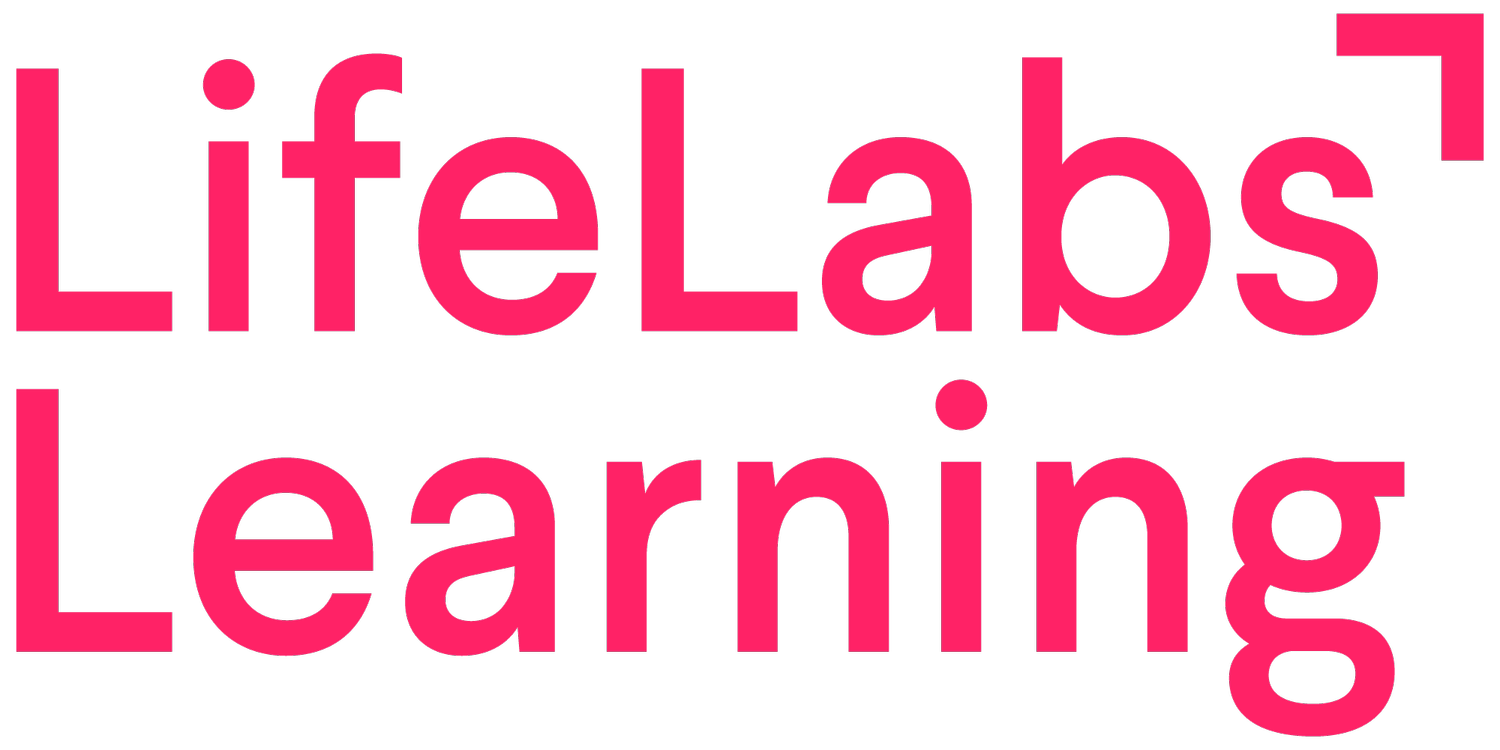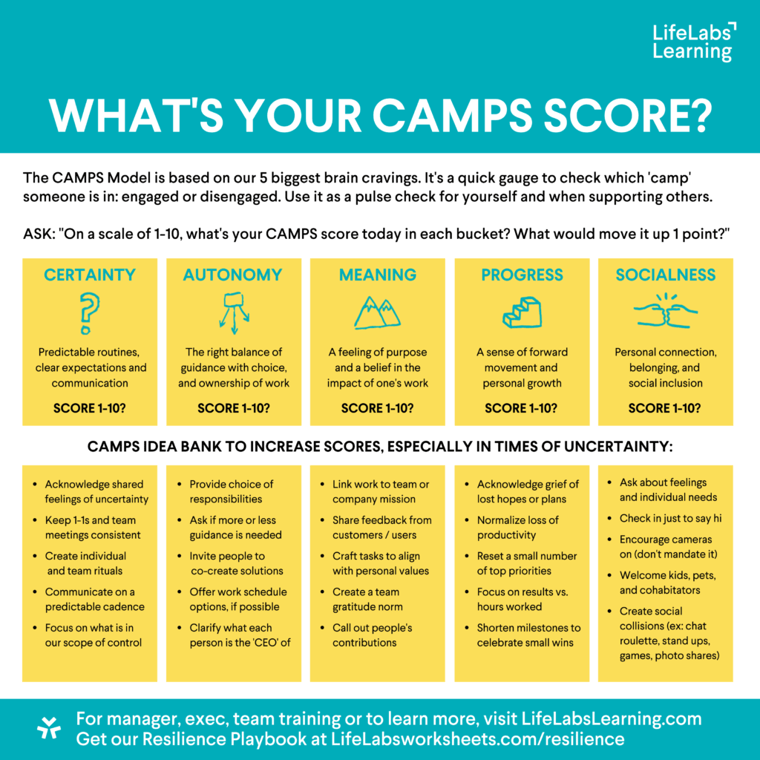What's your CAMPS score? Diagnose and fuel team engagement.
5 minute read
Imagine a team that's fired up, highly motivated, and contributing their best – that's the power of engagement!
Research from Gallup’s most extensive study of the future of work, It’s the Manager, shows engaged teams see:
20% higher sales
21% higher profitability
40% fewer quality defects
41% lower absenteeism
24% less turnover (in high-turnover companies)
59% less turnover (in low-turnover companies)
So, what ignites engagement?
It all boils down to five fundamental brain cravings – certainty, autonomy, meaning, progress, and social inclusion (including belonging and connection). Psychologists Richard Ryan and Edward Deci spearheaded research that reveals satisfying these core needs is the key to unlocking employee engagement.
Meet the CAMPS Model.
Don‘t worry; we’re not going to overwhelm you with the science of employee engagement (although we really like science!). Instead, we bring you a simple framework to help you remember the five brain cravings – the CAMPS Model.
Certainty
Autonomy
Meaning
Progress
Social inclusion
We share the CAMPS model with participants in our Effective 1-1s and Leading Change management training workshops. It’s a great tool to help you sort your team into two camps – engaged and disengaged. It directs what actions to take to get everyone into the camp where they feel genuinely engaged and motivated.
Before you try it, let's take a quick look at how each brain craving fuels employee engagement:
Certainty
Our brains crave certainty. In fact, studies show uncertainty triggers stress and hinders curiosity and connection. So when folks feel uncertain about expectations, roles, and what’s coming, engagement drops.
To satisfy this craving, leaders can help fill in knowledge gaps and build certainty by:
Setting clear expectations
Communicating priorities
Creating consistent routines and team rituals
Normalizing uncertainty in times of change
Get top tips from our Adaptivity & Resilience workshop for settling uncertainty, promoting clarity, and calming overwhelm during times of change.
Read The Leadership Resilience Conundrum: Decoding the Secrets to Change Resilience.
Autonomy
We all desire control over our work and decision-making processes. However, finding the right level of autonomy for employees can be tricky. Micromanagement is too little, and free-for-alls are too much – and both can result in anxiety and confusion. Research shows a good balance drives engagement, commitment, and productivity.
Great leaders strike an autonomy balance by:
Offering choices in daily work and weekly one-on-ones
Handing over ownership (especially of things folks are passionate about)
Providing guidance when there’s too much autonomy
Encouraging team members to set and track their goals
Meaning
People thrive on purpose, so when work feels insignificant or unaligned with individual values, it leads to disengagement – resulting in lowered productivity, performance, and motivation. However, according to research, connecting work to folks' values (even through small efforts) boosts engagement, satisfaction, and productivity.
Cultivate a deeper sense of meaning by:
Linking work to your company mission and team goals
Connecting work to peoples’ personal values
Collecting feedback from your team regularly
Acknowledging the impact of team members’ work
Progress
Forward momentum and a sense of progress create the best inner work lives, according to Teresa Amabile and Steven Kramer, authors of The Progress Principle. Small, continuous wins trigger dopamine, the "feel-good" chemical that fuels engagement.
Help your team recognize their growth, learning, and achievements by:
Setting and tracking milestones and accomplishments together
Acknowledging and sharing wins (big and small!)
Giving frequent feedback
Checking in on individual development
Social Inclusion (Fairness)
We’re wired for connection, so feeling excluded hurts. (One study even suggests taking Tylenol can help ease the pain of social rejection!) No wonder a lack of inclusion at work impacts engagement. A sense of belonging and positive team relationships boost commitment, performance, and retention.
Promote workplace inclusion by:
Encouraging small talk (research shows it builds trust and camaraderie)
Creating team bonding opportunities
Monitoring team dynamics (keep in mind dynamics often shift during change)
Sharing stories about yourself (be vulnerable)
Learn how Column Five Media worked with LifeLabs Learning to create a deliberately inclusive culture.
Do a CAMPS check.
Now that you understand the five brain cravings, you can do what we call a CAMPS check to diagnose engagement in your workplace. Here’s how:
Score: Ask your team members to rate their satisfaction in each CAMPS category on a scale of 1-10, with 10 being the highest.
Analyze: Identify any low scores – these are your engagement gaps to address.
Action: Utilize the strategies above to bridge gaps and boost individual and team engagement.
Optimize: Brainstorm what you can do to increase team members’ lowest scores by one point – get them involved!
You can use a CAMPS check to diagnose and optimize engagement for yourself and your team.
Self-Diagnosis: Take the CAMPS check to understand your own engagement.
Team Diagnosis: Do a CAMPS check in your upcoming one-on-ones to test the engagement levels of your team and find opportunities for improvement.
Be sure to share the CAMPS framework with your team for a shared vocabulary around engagement. And encourage folks to track and nurture all five CAMPS brain cravings for their own continuous growth.
Want more? Read CAMPS: Your Tried-and-True Tool for Leading Change Like a Boss.

